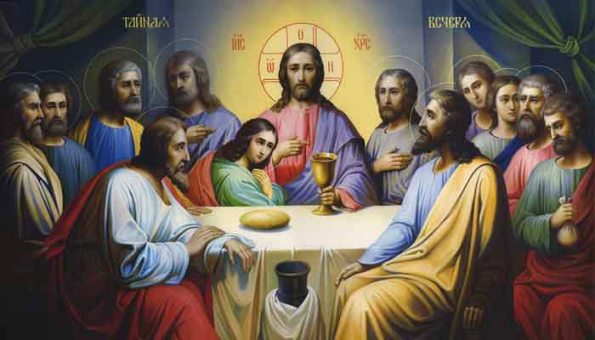DAILY MEDITATION: “If I, therefore, the master and teacher, have washed your feet, you ought to wash one another’s feet”
Liturgical day: Holy Thursday (Lord's Supper)
 Gospel text (Jn 13,1-15): Before the feast of Passover, Jesus knew that his hour had come to pass from this world to the Father. He loved his own in the world and he loved them to the end. The devil had already induced Judas, son of Simon the Iscariot, to hand him over. So, during supper, fully aware that the Father had put everything into his power and that he had come from God and was returning to God, he rose from supper and took off his outer garments. He took a towel and tied it around his waist. Then he poured water into a basin and began to wash the disciples’ feet and dry them with the towel around his waist.
Gospel text (Jn 13,1-15): Before the feast of Passover, Jesus knew that his hour had come to pass from this world to the Father. He loved his own in the world and he loved them to the end. The devil had already induced Judas, son of Simon the Iscariot, to hand him over. So, during supper, fully aware that the Father had put everything into his power and that he had come from God and was returning to God, he rose from supper and took off his outer garments. He took a towel and tied it around his waist. Then he poured water into a basin and began to wash the disciples’ feet and dry them with the towel around his waist.
He came to Simon Peter, who said to him, “Master, are you going to wash my feet?” Jesus answered and said to him, “What I am doing, you do not understand now, but you will understand later.” Peter said to him, “You will never wash my feet.” Jesus answered him, “Unless I wash you, you will have no inheritance with me.” Simon Peter said to him, “Master, then not only my feet, but my hands and head as well.” Jesus said to him, “Whoever has bathed has no need except to have his feet washed, for he is clean all over; so you are clean, but not all.” For he knew who would betray him; for this reason, he said, “Not all of you are clean.”
So when he had washed their feet and put his garments back on and reclined at table again, he said to them, “Do you realize what I have done for you? You call me ‘teacher’ and ‘master,’ and rightly so, for indeed I am. If I, therefore, the master and teacher, have washed your feet, you ought to wash one another’s feet. I have given you a model to follow, so that as I have done for you, you should also do.
“If I, therefore, the master and teacher, have washed your feet, you ought to wash one another’s feet”
Mons. José Ángel SAIZ Meneses, Archbishop of Seville
(Sevilla, Spain)
Today, we remember the first Holy Thursday of history, when Jesus Christ gathers his disciples to celebrate the Passover. He inaugurates the new Passover of the new Covenant when his sacrifice is offered for our salvation.
During the Lord’s Supper, along with Eucharist, Christ institutes the ministerial priesthood, the sacrament that will allow the Eucharist to be perpetuated. The preface of the Chrism Mass reveals its meaning: “He chooses men to share his sacred ministry by the laying on of hands. He appoints them to renew in his name the sacrifice of our redemption as they set before your family his paschal meal. He calls them to lead your holy people in love, nourish them by your word, and strengthen them through the sacraments.”
And that very same Thursday, Jesus gives us his new commandment of love: “Love one another. As I have loved you, so you must love one another” (Jn 13, 34). Before Jesus, love was based upon the expected reward in return, or upon the fulfillment of an imposed norm. Now, Christian love is based upon Christ. He loves us to the point of giving his life: this must be the measure of the disciple's love and the signal, the characteristic of Christian recognition.
However, we have no capacity to love like this. It is not simply the fruit of human effort, but a gift from God. Fortunately, He is Love and —at the same time— the source of love that we receive through the Eucharistic bread.
Finally, today we contemplate the washing of the feet. With a servant's attitude, Jesus washes the Apostles' feet, and He recommends them to wash one another's feet (cf. Jn 13, 14). There is something more than a lesson in humility in the Master's gesture. It is like a symbol of his Passion, an anticipation of the total humiliation He has to suffer to save all people.
Theologian Romano Guardini says: “The attitude of our littleness bowing down in front of the great is not yet an attitude of humility. It is simply, an attitude to truth. But when the great bows down before our littleness that is true humility.” This is why Jesus Christ is really humble. Before this humble Christ our usual patterns shatter. Jesus Christ turns human values over while inviting us to follow him to build a better and different world based on service.
Source: evangeli.net

